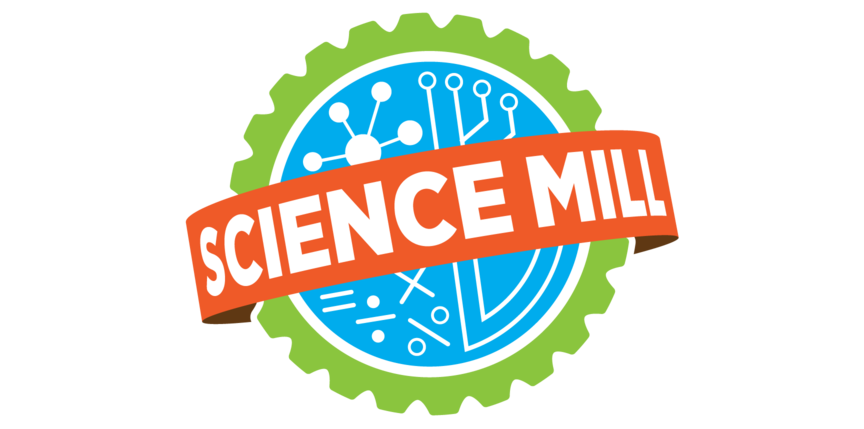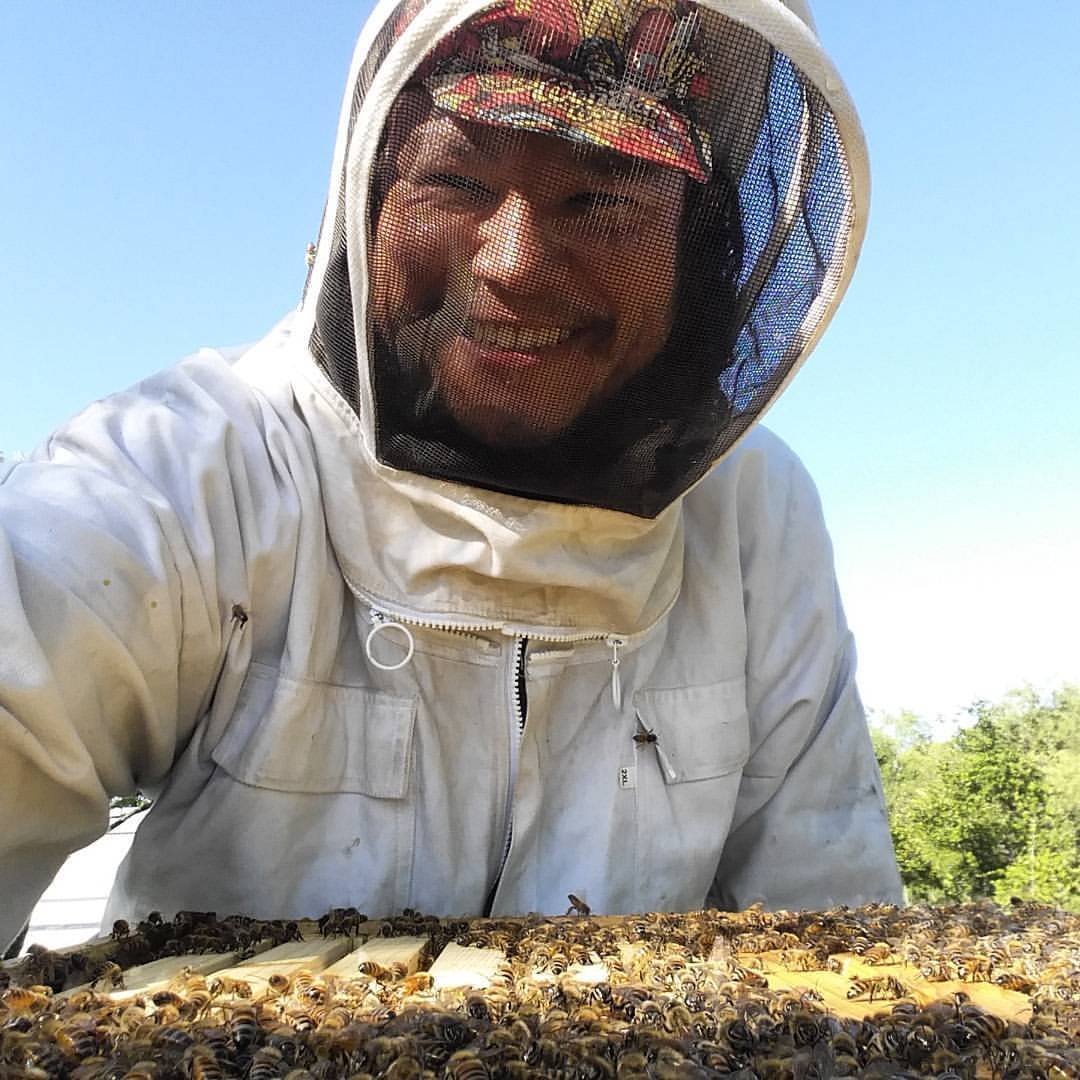STEM career INTERVIEW with Michael Mendez
Meet Michael Mendez, Texas beekeeper. Along with his own beeyard in Creedmore, Mike manages hives for Jester King Brewery and Community First! Village, where he also teaches beekeeping. When locals need a swarm relocated or beekeeping advice, Mike is the go-to guy.
Mike and his beekeeping gear return to the Science Mill on Saturday, April 23 for Butterfly Bonanza & Pollinator Pals—stop by to ask him your beekeeping questions!
***
How did you get started in beekeeping?
I’ve had an interest in nature since I was a kid and always loved being outdoors. Growing up in San Antonio, I got involved with the bird banding program at Mitchell Lake. By the time I was 18, I’d completed all the requirements to become a Texas Master Naturalist.
Beekeeping was right up my alley, but it still kind of happened by chance. My landlord was interested in beekeeping, and I helped him get set up. We had a master beekeeper visit one day; I learned so much watching how he handled the hive and he encouraged me to jump in. I started attending Texas Beekeeper Association meetings, reading everything I could, weeding through YouTube videos to find the best resources, and took the plunge starting my own hives. For the last decade, I’ve managed anywhere from a few to twenty hives at a time. Now I’m a step away from completing my own Texas Master Beekeeper certification.
What tools do you use as a beekeeper?
I currently keep my bees in Langstroth hives; those are the vertically stacked boxes you’ve probably seen. I’m thinking, however, about starting some top bar hives this season. They’re V-shaped, like a trough, and the bees attach their comb directly to tapered bars that hang down from the top. It’s like a single-story house where bees can travel front to back, so there’s less heavy lifting to check on the bees or harvest honey.
Protective gear is a must. You need a veil for your face and eyes and ideally a suit to cover your arms. The smoker helps keep you and the bees safe, too. There’s some debate around what smokers do. From my observations, the smoke helps block guard bees’ alarm pheromones. And if you wait a moment, the bees will start eating their nectar stores—they think it’s a fire and are preparing to evacuate. They’re focused on that job, so you can focus on yours.
There are lots of cool beekeeping gadgets. Bees use propolis (plant resin mixed with wax) to seal the hive, so you need a hive tool for unsticking and prying frames out. Queen cages are neat: they help you safely introduce a new queen while the other bees get used to her smell. I like to carry a magnifying glass, too, for getting a closer look.
Mike’s beekeeping tools in action
What skills do beekeepers need?
Observe, observe, observe! That’s true with rearing any kind of livestock: you need to spend time with the animals, get to know their behaviors, understand what their baseline looks like and see what signals a change.
Beekeepers also need a strong understanding of bee biology. The bee life cycle, from egg to adult, is my key to decoding problems; I can see where there’s a break in that cycle. I have a mental checklist when I visit a hive: I go through what’s supposed to be there and in what stage—brood, adult bees, wax, comb, nectar, pollen, honey—then compare that to what I actually see (or what’s missing) to identify issues.
One of my favorite things about beekeeping is that it’s totally in the moment. This is high-focus work. You’re looking for eggs smaller than a grain of rice or a queen who blends in with the comb, all while bees buzz around and warning pheromones burn your eyes. You need to stay calm, stay focused, and move methodically. Working with bees trains you to be a strategic thinker, so you can respond quickly in the moment—like planning ahead how you’ll reach your car keys if you encounter an aggressive hive!
Chatting with Science Mill visitors at last year’s Butterfly Bonanza event
STEM CAREER SPOTLIGHT
So: could beekeeping be a good fit for you?
Here are some key interests and skills related to beekeeping; if these sound like you or are things you’d like to develop, beekeeping could be a good match:
Curious about how things grow and cycles of change
Enjoy working outdoors
Like insects and plants
Strong observation skills
Analytical thinker
Able to maintain focus in the moment
Good manual dexterity / enjoy working with your hands
You might also be interested in STEM fields similar to beekeeping, such as careers in agriculture, horticulture, animal science and natural resources. Our Explorer Zone episode on the Aquaponics Greenhouse has some good recommendations to check out. Beekeeping is also a great example of a STEM career where you build skills through on-the-job experience, rather than in a formal classroom setting. If that appeals to you, look into STEM fields that include trade schools and on-the-job apprenticeships – for example, solar electrician/solar installer.
MORE TO EXPLORE
Follow Mike’s beekeeping adventures on Instagram: @beekeeper_mike_mendez
Texas Master Naturalist program – A big inspiration for Mike; program volunteers will be joining the Science Mill for Butterfly Bonanza, so you can learn more, too!
iNaturalist – Mike uses this out in the field to identify native bee species and other wildlife
Xerces.org – The latest news and ways to get involved with bee and pollinator conservation




Helpful resources to get started, whether you’re interested in beekeeping as a hobby or exploring careers in beekeeping, pollinator services or conservation:
Texas Beekeepers Association – You can also find local associations to join. Beekeeping can be an expensive hobby to start, so it’s great to shadow an experienced keeper first.
Texas Master Beekeeping Program – You may not be ready to jump into the certification process, but their reading lists and resources on bee health are excellent for any level.
Recommended books:
The Beekeeper’s Handbook, 4th Ed. by Diana Sammataro and Alphonse Avitabile
Beekeeping: A Practical Guide by Richard E. Bonney
First Lessons in Beekeeping by Keith S. Delaplane
Top-Bar Beekeeping: Organic Practices for Honeybee Health by Les Crowder and Heather Harrell
Recommended YouTube channels and videos:
Texas Beekeepers Association
Texas Bee Supply
Honey Bee Health Coalition
From egg to adult bee time lapse
How do bees make honey?
What do bees use pollen for?
How do honeybees get their jobs?
Beginner’s hive inspection with Blake Shook
Interview with Mary Reed, Texas chief apiary inspector
Charlie Bee Company (PBS)